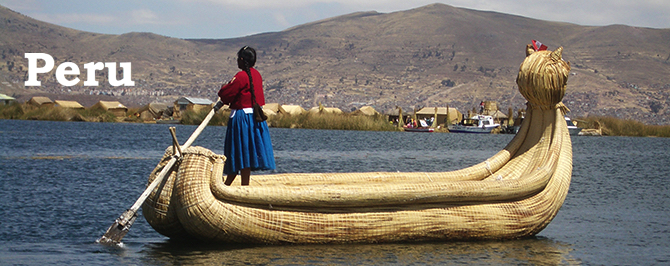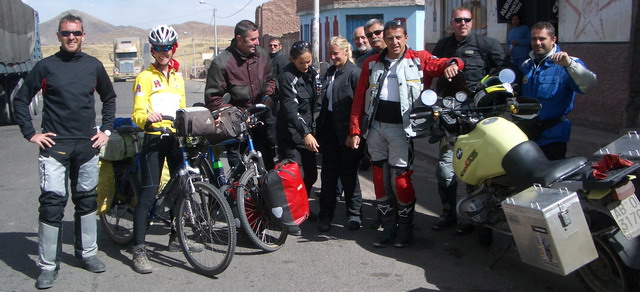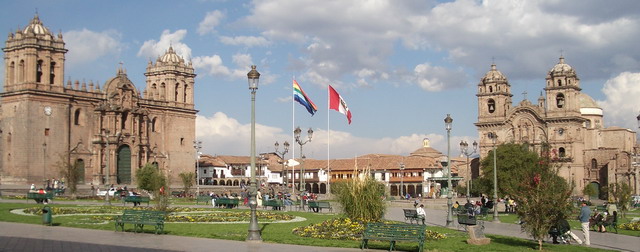|
|
Aug 18 – Aug 30, 2006 Lago Titicaca – Puno – Raqchi – Cusco |
|
| Lake Titicaca was the backdrop to our first few days in Peru. This amazing blue lake, surrounded by terraces of brown and gold, was quite Mediterranean in appearance. Thatched cottages, cocks of hay, stone walls and roaming donkeys, sheep and llamas added a unique Peruvian touch to the picture. |
|
|
|
|
| The first 200km across the border from Bolivia were treacherous. Coaches and minibuses sped past, overtook without regard for anyone else on the road, left absolutely no space for cyclists and seemed to think a loud hoot of their horn would just clear the way. | |
|
The remains of a bus crash |
The narrow road, with no hard shoulder, was no help. Blessed cars from Copacabana, with sloshed drivers, seemed to think the virgin’s power was sufficient to bring them home safely. However, numerous roadside crosses at 100m intervals were a constant reminder of the high death toll on this flat stretch. |
| No visit to Puno is complete without a trip to the floating islands of the Uros. This theatrical performance gives an idea of how this tribe lived in former times. As hunters and fishermen, they moved out onto the water to be closer to their prey and farther from their enemies i.e. the Incas. |
|
|
Reeds |
By stacking layers of cut reeds on the tufts of their roots, the Uros formed floating islands on which they built their little reed huts. |
| As reed was the only raw material available, they also built boats with bundles of tightly packed reed, which lasted a year before rotting. |
|
|
Selling Uros' souvenirs |
Today, they set up camp on the islands before the tourists start arriving at 9am, and make a living selling souvenirs, before returning to their houses on the mainland. |
| Puno
is one of these tourist destinations where it’s difficult to eat out
without being subjected to musicians on pan flutes and charangos playing
typical music of the Andes like “El Condor Pasa”, “Let it be” and
“The soundtrack of Titanic”!
|
|
|
Triciclo taxis, Juliaca |
A
half day later we stopped in Juliaca, where we got excellent local
food without the tourist trappings. We sped on triciclos around
town and invested in two potent horns for the bikes to blend in with the
local traffic! |
|
|
|
|
Bumped into 20 Italian bikers on a 4-week trip from Ecuador to Chile... |
|
| Then we had another two days against the wind, racing rain clouds... |
|
|
Altiplano, Peru |
...in typical Patagonian-like scenery... |
| ...up to our first Peruvian pass at 4338masl. |
|
|
Traditional farming |
As we
descended, temperatures rose and the scenery got greener by the Km. There
were even trees and the terraces were filled with crops. The fields were a
hive of activity and men and women alike were industriously planting,
ploughing and harvesting in the afternoon sun.
|
|
|
|
| We were rarely alone on the road with lots of locals cycling alongside us between villages. School-going kids and teenagers look cute with their sweet smiles and well-kept uniforms… until they open their mouths. Mobs of students, blocking the road and aggressively shouting “Gringo, dame plata” (Gringo, give me money) does tend to reduce their appeal and make weekends a whole lot more pleasant for the cyclist. |
|
|
Wiracocha Temple, Raqchi |
On
and off the Inca trail
these past three months from northern Argentina through Chile and Bolivia;
it’s only now that we are in Inca ruin territory. In Raqchi, we
were very impressed by the huge temple complex dedicated Wiracocha, the
supreme Inca God and creator of the sun and moon. |
| Dating back to the 15th Century or the golden years of Inca rule, this complex is built of adobe, on a base of volcanic rock, making it earthquake proof. Ingenious architectural planning allows the sun to shine along the main thoroughfare on the winter solstice. |
|
|
Granaries |
It
also served as a granary for the kingdom, storing harvests over long
periods for meager years. |
| Hats became even more varied and ridiculous as we approached Cusco… | |
|
|
|
| Need a lampshade? | |
|
|
|
| We
were warned about the awful tourist trap Cusco is, but after 3 days
here, we love it! This former Inca capital provided a perfect base for the
Spanish conquerors' ornamental churches and palaces. Today there is a
wonderful blend of Inca walls and Andalucian-style red-tiled, white-washed
mansions, with arcades, wooden balconies and bay windows. Cobblestone
streets and spacious plazas provide the veins for Cusco’s pulsating
traffic. |
|
|
|
|
|
Renate and Ralf |
With
Cusco being the destination in South America, it was inevitable
that we bump into one of Darina’s former pupils. Renate and her partner
Ralf, from St. Gallen provided us with a very entertaining evening,
while tucking into local alpaca steaks. |



